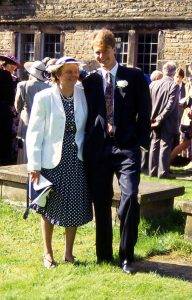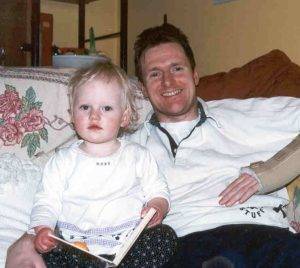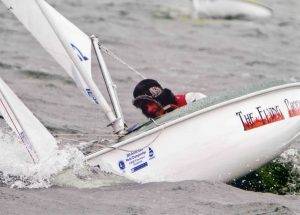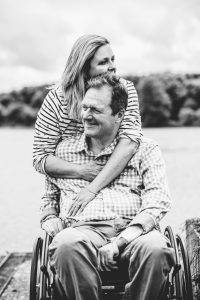 I was 31 at the time of my accident. My job with Brann Direct Marketing was interesting, and I worked alongside fantastic colleagues and clients. Life was going really well; I’d recently become a father, and had been promoted to Director on the Agency board. We were all in good health, had some great friends, and I still enjoyed playing tennis, golf, and skiing; the life ahead looked good.
I was 31 at the time of my accident. My job with Brann Direct Marketing was interesting, and I worked alongside fantastic colleagues and clients. Life was going really well; I’d recently become a father, and had been promoted to Director on the Agency board. We were all in good health, had some great friends, and I still enjoyed playing tennis, golf, and skiing; the life ahead looked good.
In an instant that life was taken away. My paralysis is as a result of diving into the shallow end of a swimming pool while on a family holiday with some close friends at a villa near Bergerac, France. I floated to the top, and my friends had to lift me out of the cold water and keep me conscious for the 40 minutes until the ambulance arrived. I was operated on in Bordeaux, before being air lifted to Stoke Mandeville. After 6 weeks there I was told that I wouldn’t walk again. My neck was broken at level c5, which means that I have no function or feeling below my chest. There is no active function in my hands, but I can extend my wrist to give a very weak tenodesis grip. Feeling is very patchy in my arms and hands, and I’m in constant neurological pain in my shoulders and forearms.
 I remained in hospital for 11 months before returning home. The house had been adapted with level access, the garage had become a bedroom and wet room, a hoist had been fitted to the ceiling, there was a through floor lift to upstairs, and a shower chair had been delivered. A care package had been agreed to cover my 24/7 needs between my wife and a local care agency. Everybody had to go through specialist training to understand the idiosyncracies of people with spinal cord injury. It was very hard to come to terms with being completely dependent on people for everything, and to suddenly not have a structure or purpose to my life. That said, I was always quite pragmatic about my situation, and soon realised that there was nothing that I could do change it, so I had to find things that I could do in my new state.
I remained in hospital for 11 months before returning home. The house had been adapted with level access, the garage had become a bedroom and wet room, a hoist had been fitted to the ceiling, there was a through floor lift to upstairs, and a shower chair had been delivered. A care package had been agreed to cover my 24/7 needs between my wife and a local care agency. Everybody had to go through specialist training to understand the idiosyncracies of people with spinal cord injury. It was very hard to come to terms with being completely dependent on people for everything, and to suddenly not have a structure or purpose to my life. That said, I was always quite pragmatic about my situation, and soon realised that there was nothing that I could do change it, so I had to find things that I could do in my new state.
I tried a number of activities, therapeutic work, and had intensive physiotherapy. Although all these things helped to fill the void, none of them were particularly fulfilling. Wheelchair rugby became an activity that did give me back a lot of confidence and self belief. I wasn’t functionally very able, and I was never going to be a top player, but it gave me fitness, strength, a new social life, and great camaraderie with people in similar situations across the country.
Sailing was different. After several bad experiences, I discovered that with the right equipment I could not only sail independently, but be competitive against good able-bodied sailors. Being out on the lake or sea by myself is incredibly liberating and exhilarating. I have always been competitive, and regularly race at my club and in Hansa Class events domestically and internationally. While I’m racing I am completely focused on what I am doing, and all the pain and challenges of life go away. Watch this video to see in my own words how I got into sailing.
 Apart from my participation in wheelchair rugby and sailing, I have taken on responsibility for building the RYA Sailability group at my local club, Whitefriars SC in the Cotswolds. I’m also Treasurer and Trustee for the Hansa Class UK which run racing and training for sailors in the Hansa class of boats. In rugby I am Chairman of Gloucester Wheelchair Rugby Club, and still play and coach. These roles have given me back an opportunity to use my past professional skills, adding another rewarding dimension to my life. The Backup Trust gave me my first introduction to sailing 12 years ago. They inspire people who have spinal injuries to realise what is still possible. I have group led many of their courses over the years, and still mentor people who need advice or help to deal with their situation.
Apart from my participation in wheelchair rugby and sailing, I have taken on responsibility for building the RYA Sailability group at my local club, Whitefriars SC in the Cotswolds. I’m also Treasurer and Trustee for the Hansa Class UK which run racing and training for sailors in the Hansa class of boats. In rugby I am Chairman of Gloucester Wheelchair Rugby Club, and still play and coach. These roles have given me back an opportunity to use my past professional skills, adding another rewarding dimension to my life. The Backup Trust gave me my first introduction to sailing 12 years ago. They inspire people who have spinal injuries to realise what is still possible. I have group led many of their courses over the years, and still mentor people who need advice or help to deal with their situation.
 It took some time to rebuild my confidence, and to find things that I found rewarding and fulfilling. I was fortunate enough to meet my new wife 4 years ago. She has become very involved with my activities, and is very supportive. We still have carers, but we are in a position to work this around our lives together. It is a lot of hard work for her, but it does give us more control and flexibility.
It took some time to rebuild my confidence, and to find things that I found rewarding and fulfilling. I was fortunate enough to meet my new wife 4 years ago. She has become very involved with my activities, and is very supportive. We still have carers, but we are in a position to work this around our lives together. It is a lot of hard work for her, but it does give us more control and flexibility.
I called my boat the Flying Phoenix 2. As I’m sure you’re aware, the Phoenix is a bird, which in Greek mythology lives for a long time, dies, and is reborn from the flames. My life has changed beyond belief since that day in 1999, and I felt that it has been analogous to that of a Phoenix. It is also a symbol on the Cirencester coat of arms. I live and worked in Cirencester, funnily enough on Phoenix Way. Coincidentally my doctor’s surgery is also, you guessed it, Phoenix Surgery. I added Flying to it because of the independence, exhilaration, and speed that sailing provides. My current boat is my second Flying Phoenix, hence 2.
You can read more about my journey on my blog.



